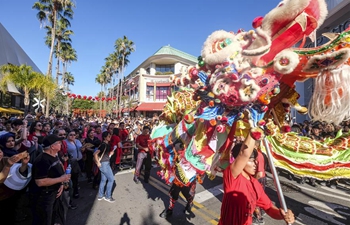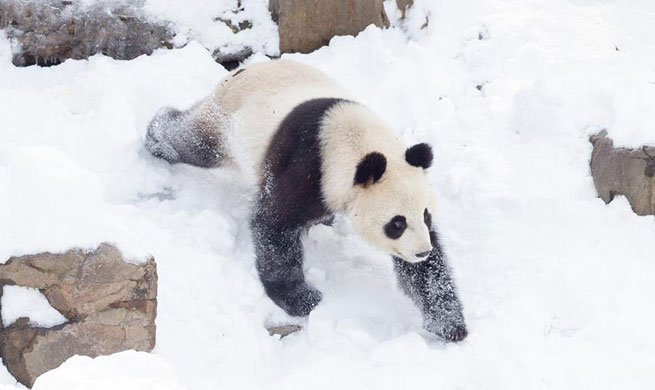TOKYO, Jan. 30 (Xinhua) -- The unemployment rate in Japan increased in December last year from a month earlier, the government said in a report on Tuesday, while labor shortages not being converted into wage growth has added to the central bank's woes in trying to achieve its inflation target.
According to the Ministry of Internal Affairs and Communications, the unemployment rate here increased from 2.7 percent logged a month earlier, to 2.8 percent in the recording month, worsening for the first time in seven months.
The ratio of job offers to job seekers, meanwhile, stood at 1.59 in December improving from 1.56 in November, marking the highest levels since January 1974 and rising for the third straight month, the Ministry of Health, Labor and Welfare said.
The figure translates to meaning that 56 positions were available for every 100 workers seeking a job in that period.
The unemployment rate in 2017 dropped from 3.1 percent a year earlier, to 2.8 percent in the recording year, the government's latest data also showed, marking the seventh successive year of decline and the lowest level since 1993.
The jobless rate for females hit a 24-year-low of 2.7 percent, from 2.8 percent in 2016, while the rate for males stood at 3.0 percent, dropping from 3.3 percent logged a year earlier.
But household spending, a key gauge of current and future consumer confidence regarding spending, edged down 0.1 percent from a year ago to 322,157 yen (2,959 U.S. dollars), marking the first decline in three months, the ministry said.
Private consumption accounts for 60 percent of Japan's Gross Domestic Product (GDP) and despite the economy continuing on a moderate recovery path, households have continued to tighten their purse strings amid a murky outlook for income and expenditure, with increasing prices for fresh food in particular hurting consumer sentiment in December, the government's figures showed.
A planned consumption tax hike is likely to compound the issue and exacerbate households' thriftiness as Japan's "deflationary mindset" becomes increasingly ingrained in households' thinking about spending and expenditure.
Following consumption tax hikes from 3 to 5 percent in 1997 and from 5 to 8 percent in 2014 while consumption spiked before the levies were increased, on both occasions the economy ended up in recession as a result of the hike.
The government, knowing the economy would wobble and likely be plunged into recession again, has pushed back the timing of the next tax hike, from 8 percent to 10 percent, from October 2015 to April 2017 and then to October 2019, leading economists here have pointed out.
The central bank here has unrolled a number of aggressive monetary easing measures in a bid to overcome decades of deflationary pressure in Japan and in terms of salaries. There has been a moderate uptick on an annualized basis.
The latest figures showed that the average monthly income of salaried households with two or more people increased 0.4 percent on-year to 940,875 yen (8,646 U.S. dollars), marking a seventh straight month of increases, with Japanese workers receiving winter bonuses at this time of year.
Despite an on-year rise in wholesale prices, however, the Bank of Japan is still struggling to convert the effects into a significant rise in inflation.
The BOJ announced recently that it would maintain its aggressive monetary easing policy as it continues to grapple to achieve its lofty 2 percent inflation target, with the bank conceding inflation is just above zero despite a moderate economic expansion.
"Japan's economy is expanding moderately but inflation remains weak," BOJ Governor Haruhiko Kuroda told a press conference after the conclusion of the central bank's most recent two-day policy board meeting last week.
"Other countries are facing similar situations but unlike these countries, many of whom are seeing inflation move around 1.5 percent, inflation, excluding energy costs, is barely above zero percent in Japan," Kuroda said.
The Statistics Bureau also said the core consumer price index, excluding fresh food prices due to their volatility, increased for the 12th consecutive month in December, on the heels of a 0.9 percent rise logged a month earlier.
The index, however, still remained a long way below the BOJ's 2 percent inflation target.
Booking a positive reading for the first time in two years, the CPI for 2017 increased 0.5 percent, the ministry also said, compared with a drop of 0.3 percent in 2016.
The government's data also showed that when excluding fresh food and energy prices for their volatility, "core-core" consumer prices increased just 0.1 percent in 2017, compared to a 0.6 percent rise logged for the previous year.
Japan's economy grew at an annualized rate of 2.5 percent in the July-September period, owing to solid overseas demand, yet the jobless rate has been below the 3 percent mark for the majority of 2017 and consumption remains strained and prices pressured.
With labor shortages also not being converted into solid wage growth and consumption also being hindered from yet another angle, the BOJ's 2 percent inflation target is becoming increasingly elusive, leading economists have attested.
















